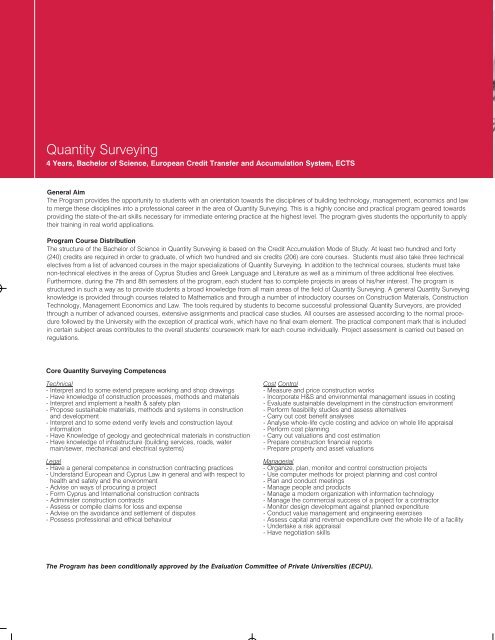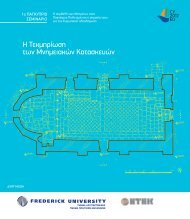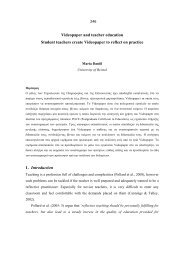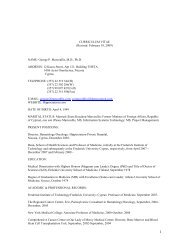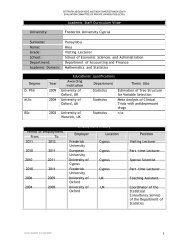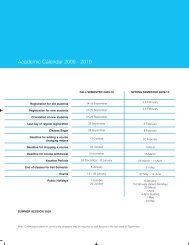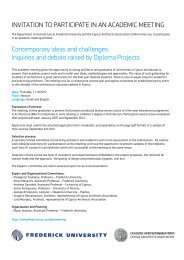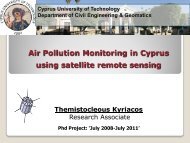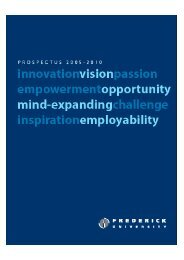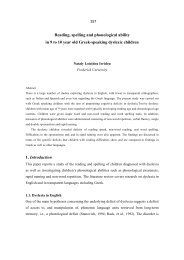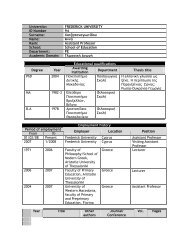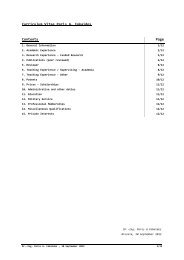Untitled - Frederick University
Untitled - Frederick University
Untitled - Frederick University
Create successful ePaper yourself
Turn your PDF publications into a flip-book with our unique Google optimized e-Paper software.
Quantity Surveying<br />
4 Years, Bachelor of Science, European Credit Transfer and Accumulation System, ECTS<br />
General Aim<br />
The Program provides the opportunity to students with an orientation towards the disciplines of building technology, management, economics and law<br />
to merge these disciplines into a professional career in the area of Quantity Surveying. This is a highly concise and practical program geared towards<br />
providing the state-of the-art skills necessary for immediate entering practice at the highest level. The program gives students the opportunity to apply<br />
their training in real world applications.<br />
Program Course Distribution<br />
The structure of the Bachelor of Science in Quantity Surveying is based on the Credit Accumulation Mode of Study. At least two hundred and forty<br />
(240) credits are required in order to graduate, of which two hundred and six credits (206) are core courses. Students must also take three technical<br />
electives from a list of advanced courses in the major specializations of Quantity Surveying. In addition to the technical courses, students must take<br />
non-technical electives in the areas of Cyprus Studies and Greek Language and Literature as well as a minimum of three additional free electives.<br />
Furthermore, during the 7th and 8th semesters of the program, each student has to complete projects in areas of his/her interest. The program is<br />
structured in such a way as to provide students a broad knowledge from all main areas of the field of Quantity Surveying. A general Quantity Surveying<br />
knowledge is provided through courses related to Mathematics and through a number of introductory courses on Construction Materials, Construction<br />
Technology, Management Economics and Law. The tools required by students to become successful professional Quantity Surveyors, are provided<br />
through a number of advanced courses, extensive assignments and practical case studies. All courses are assessed according to the normal procedure<br />
followed by the <strong>University</strong> with the exception of practical work, which have no final exam element. The practical component mark that is included<br />
in certain subject areas contributes to the overall students' coursework mark for each course individually. Project assessment is carried out based on<br />
regulations.<br />
Core Quantity Surveying Competences<br />
Technical<br />
- Interpret and to some extend prepare working and shop drawings<br />
- Have knowledge of construction processes, methods and materials<br />
- Interpret and implement a health & safety plan<br />
- Propose sustainable materials, methods and systems in construction<br />
and development<br />
- Interpret and to some extend verify levels and construction layout<br />
information<br />
- Have Knowledge of geology and geotechnical materials in construction<br />
- Have knowledge of infrastructure (building services, roads, water<br />
main/sewer, mechanical and electrical systems)<br />
Legal<br />
- Have a general competence in construction contracting practices<br />
- Understand European and Cyprus Law in general and with respect to<br />
health and safety and the environment<br />
- Advise on ways of procuring a project<br />
- Form Cyprus and International construction contracts<br />
- Administer construction contracts<br />
- Assess or compile claims for loss and expense<br />
- Advise on the avoidance and settlement of disputes<br />
- Possess professional and ethical behaviour<br />
Cost Control<br />
- Measure and price construction works<br />
- Incorporate H&S and environmental management issues in costing<br />
- Evaluate sustainable development in the construction environment<br />
- Perform feasibility studies and assess alternatives<br />
- Carry out cost benefit analyses<br />
- Analyse whole-life cycle costing and advice on whole life appraisal<br />
- Perform cost planning<br />
- Carry out valuations and cost estimation<br />
- Prepare construction financial reports<br />
- Prepare property and asset valuations<br />
Managerial<br />
- Organize, plan, monitor and control construction projects<br />
- Use computer methods for project planning and cost control<br />
- Plan and conduct meetings<br />
- Manage people and products<br />
- Manage a modern organization with information technology<br />
- Manage the commercial success of a project for a contractor<br />
- Monitor design development against planned expenditure<br />
- Conduct value management and engineering exercises<br />
- Assess capital and revenue expenditure over the whole life of a facility<br />
- Undertake a risk appraisal<br />
- Have negotiation skills<br />
The Program has been conditionally approved by the Evaluation Committee of Private Universities (ECPU).


